Political manga perfectly combines two distinguishing features of life in Taiwan — irreverence toward politicians and a Japan-influenced love of manga and anime stylings.
And since President Tsai Ing-wen’s (蔡英文) unprecedented rise to Taiwan’s highest office in 2016, she has become a compelling character for local comic book artists. This is no coincidence, for the medium excels at portraying exceptional and exaggerated personalities. And their playful depictions of Tsai reveal complex and evolving attitudes toward female political leadership.
TAIWAN’S SUPERWOMAN
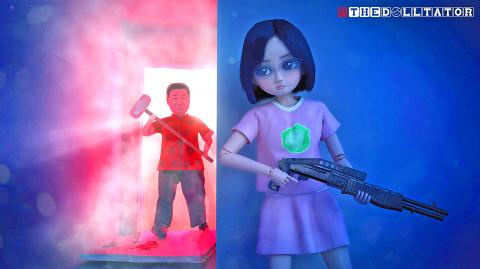
Photo courtesy of Lincoln Li
In Conquerer of the Seas Emperor Ing (霸海皇英), published in August 2016 by Wei Tsung-cheng (韋宗成), a young girl named Ing (瑛) grows up on a patriarchal island-nation caught in the shadow of a dictator surnamed Chiang (蔣). At her birth, she radiates a feminine glow that literally tames wild animals. She grows up to overthrow the oppressive forces that terrorize her people.
The work is a thinly veiled recasting of Tsai’s life and 2016 election victory in the genre of superhero comics, meaning black-and-white morality, characters with superhuman abilities, epic battle scenes, dramatic narration and stylized dialogue.
“Since politicians are always mocking and manipulating (惡搞) the people, I thought of creating a book that did the same to them in the form of a Taiwanese martial arts fantasy,” Wei told the Taipei Times.
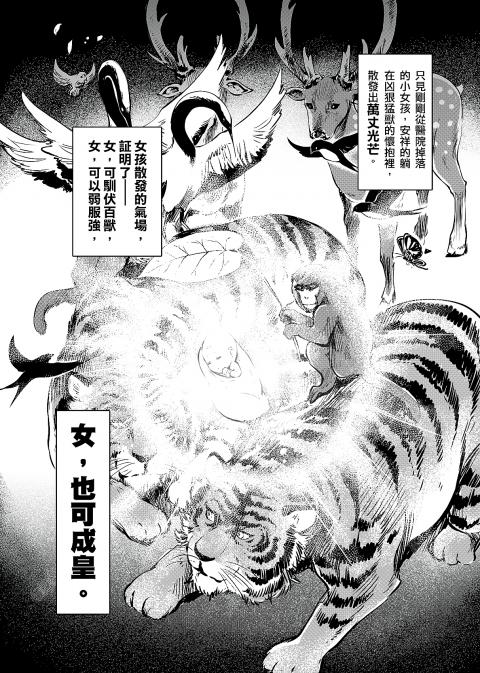
Photo courtesy of Wei Tsung-cheng
Emperor Ying was his sophomore effort and a natural sequel to 2009’s Emperor Ma Arrives (馬皇降臨), about then-president Ma Ying-jeou (馬英九).
Emperor Ma Arrives describes the rise of Huang (騜), an analog of Ma, under the tutelage of the family of Chiang Kai-shek (蔣介石). Huang trains to meet the Bian Emperor (扁皇) in a pugilistic showdown, where he finally claims his rightful place on the throne. Like Ing, Huang’s sex appeal is emphasized and he often appears shirtless with bulging muscles. Yet unlike Ing, Huang does not have any feminine energy to set him apart in a world run by powerful men. Instead, Wei has Huang’s power come from being the human incarnation of a dragon.
Unlike editorial cartoons satirizing topical political issues and figures, Taiwan’s political manga is a grassroots medium. Artists usually test the waters by posting works on social media first, with only the most popular making the leap to print publishing.
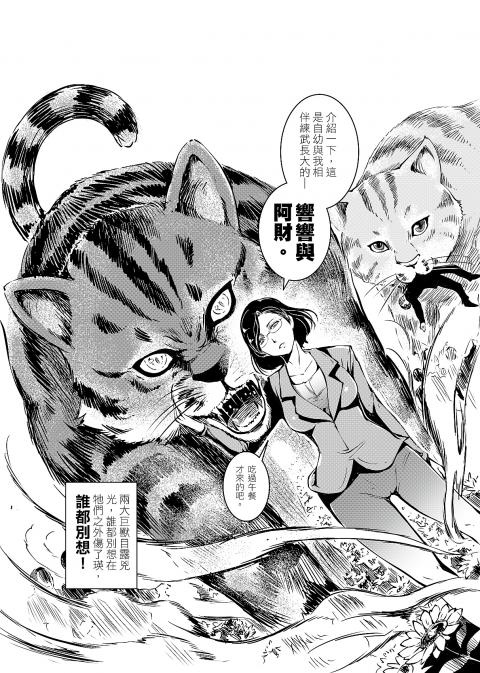
Photo courtesy of Wei Tsung-cheng
With few exceptions, the depiction of women in comic books has long been a lightning rod for controversy. The medium is often criticized for flattening female characters into gendered stereotypes with limited agency, whose main preoccupation is to compete with each other for a man’s affections. Think of the girl-next-door and femme fatale archetypes popularized by Betty and Veronica as they chase after the eponymous Archie.
Female characters are also framed by what British film theorist Laura Mulvey has called the “male gaze,” in which women appear as sexual objects for men’s viewing pleasure. The practice is so ubiquitous in manga and anime that it has spawned its own terminology — “fan service,” which describes the gratuitous cleavage or panty shots that have no apparent relation to the story.
Given the spotty record of female representation in comic books, stories centered on Tsai contain an intriguing tension as they pit conventions of the medium against the reality of a female president who has shattered glass ceilings.
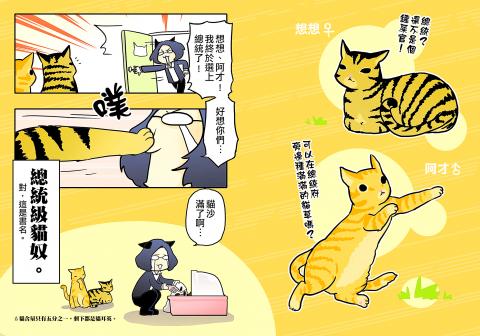
Photo courtesy of Stupid Sheep and Strange Creatures
Even as Ing is busy defeating her foes, Wei’s character design and panel composition emphasize her appeal to male fantasies. As a girl, her doe-like appearance in a school uniform sparks fights between neighborhood boys. As a woman, tight-fitting pantsuits accentuate her bosom and cling to her inner thighs.
Wei said that while the irony of Ing’s sexualization amid her story of overcoming patriarchal forces was “very interesting,” the character was designed on the basis of “business considerations.”
“The main character of a comic must have a certain visual appeal in order to attract readers,” he said, adding that the same principle of beautification was also applied to the male lead of Emperor Ma Arrives.
‘A GENTLE FEMALE PRESIDENT’
While some may view such artistic decisions as subject to the logic of the market, other artists find meaning in playing against readers’ expectations.
On Jan. 2, the day of Chinese President Xi Jinping’s (習近平) speech on the question of unification, a graphic of a bespectacled and bobbed young girl armed with a rifle in position to ambush an older man holding a primitive sledgehammer began to circulate on social media.
“‘Sledgehammer Diao’ vs ‘Shotgun Dsai.’ Who will win?” the caption teases. Dsai and Diao closely resemble Tsai and Xi respectively. The message is clear: Dsai’s relative firepower subverts the visual cues of her fairer sex, tender age and dainty physique clad in pastel pink. To underestimate her would be foolish.
The graphic was made by The Dolltator (娃娃獨裁者), pen name of US-based 3D animator and filmmaker Lincoln Li (李宇豐). Li designed his characters to personify political values associated with their real-life counterparts. Dsai in particular embodies Tsai’s image as an “iron fist in a velvet glove.”
“In my opinion, the mission of art is to discuss the humanity that lies behind a certain social issue, said Li, adding that the graphic was his way of “criticizing the bullies who pick on the weak, while praising the weak who strive to be strong and stand up to the mighty.”
Perhaps what Tsai’s presidency ultimately gives the comic book medium is the same that her supporters find in her — the chance to imagine a leading lady who is not afraid to deviate from expectations of her gender, and who turns her perceived weaknesses into strengths.
It is a direct response to those who have criticized Tsai for being an unmarried and childless woman. For Han Ching (韓璟), spokesperson for artist Stupid Sheep and Strange Creatures (蠢羊與奇怪生物), “it is precisely because [Tsai] overturned those traditions that we have a chance to see more possibilities, and she demonstrates for us that women can have an alternative way of life.”
Han said that Stupid Sheep’s comic Presidential Slave to Cats (總統級貓奴) is an attempt to make Tsai more approachable by portraying her in the cute likeness of a cartoon character. The comics highlight Tsai’s devotion to real-life pet cats Think Think (想想) and A-tsai (阿才). While this approach is lighthearted, Han noted that the reality is sobering.
“Taiwanese society, especially in the political sphere, is not that friendly to women,” Han said, pointing to past criticism of Tsai for not being more strident, or “manly,” in her administration’s cross-strait policy.
What to do when one is neither enough of a man nor enough of a woman for the public’s liking?
“Our society needs to break away from dualistic thinking,” said Han, adding that ultimately, “the idea of ‘a gentle female president’ should not present a conundrum,” because gentleness is neither an essentially female attribute nor inherently weak.
Cultural representation has always been a central part of any effort to change societal attitudes and mindsets. One can only hope that Taiwan’s comic book artists and other creators of popular culture will continue to strive to depict women — and men — fairly and respectfully.

Feb. 17 to Feb. 23 “Japanese city is bombed,” screamed the banner in bold capital letters spanning the front page of the US daily New Castle News on Feb. 24, 1938. This was big news across the globe, as Japan had not been bombarded since Western forces attacked Shimonoseki in 1864. “Numerous Japanese citizens were killed and injured today when eight Chinese planes bombed Taihoku, capital of Formosa, and other nearby cities in the first Chinese air raid anywhere in the Japanese empire,” the subhead clarified. The target was the Matsuyama Airfield (today’s Songshan Airport in Taipei), which

On Jan. 17, Beijing announced that it would allow residents of Shanghai and Fujian Province to visit Taiwan. The two sides are still working out the details. President William Lai (賴清德) has been promoting cross-strait tourism, perhaps to soften the People’s Republic of China’s (PRC) attitudes, perhaps as a sop to international and local opinion leaders. Likely the latter, since many observers understand that the twin drivers of cross-strait tourism — the belief that Chinese tourists will bring money into Taiwan, and the belief that tourism will create better relations — are both false. CHINESE TOURISM PIPE DREAM Back in July
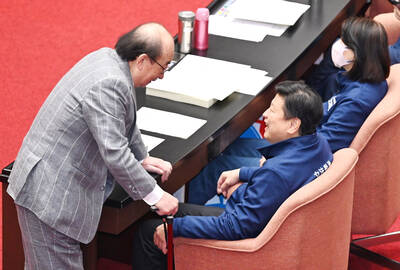
Could Taiwan’s democracy be at risk? There is a lot of apocalyptic commentary right now suggesting that this is the case, but it is always a conspiracy by the other guys — our side is firmly on the side of protecting democracy and always has been, unlike them! The situation is nowhere near that bleak — yet. The concern is that the power struggle between the opposition Chinese Nationalist Party (KMT) and their now effectively pan-blue allies the Taiwan People’s Party (TPP) and the ruling Democratic Progressive Party (DPP) intensifies to the point where democratic functions start to break down. Both

This was not supposed to be an election year. The local media is billing it as the “2025 great recall era” (2025大罷免時代) or the “2025 great recall wave” (2025大罷免潮), with many now just shortening it to “great recall.” As of this writing the number of campaigns that have submitted the requisite one percent of eligible voters signatures in legislative districts is 51 — 35 targeting Chinese Nationalist Party (KMT) caucus lawmakers and 16 targeting Democratic Progressive Party (DPP) lawmakers. The pan-green side has more as they started earlier. Many recall campaigns are billing themselves as “Winter Bluebirds” after the “Bluebird Action”